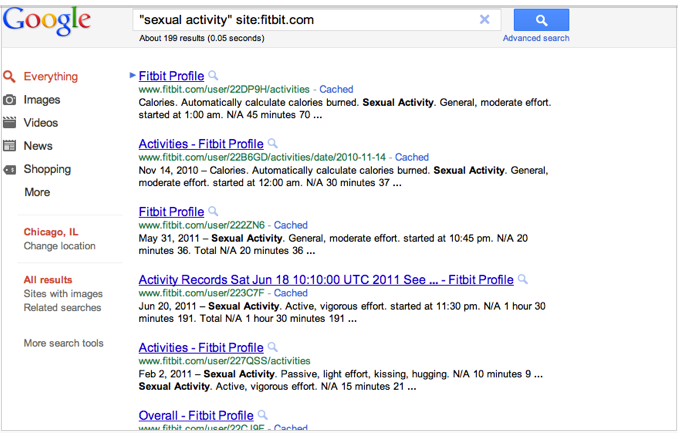
Wearable fitness trackers are common place these days, and are set to become even more popular with the introduction of the Apple Watch this year. Smart clothes are already on the market, and sales of smart clothes are expected to grow from 100,000 shipments last year, to 26 million next year!
All this technology certainly collects an impressive set of data on you as an individual , but if you’re going to use any health data tracking devices, you need to be sure of the security of your data. Or, you could prefer to use the Rating of Perceived exertion to help regulate your pace.
Back in 2011, it was found that people’s sexual activity as recorded on their Fitbits, could be found on the net by a Google search. The problem was that Fitbit’s default privacy setting allowed users’ profiles to be found on-line. If you didn’t unclick this setting, your profile automatically become public for anyone to see whatever data was uploaded to the Fitbit site. The good people at Fitbit have since changed the default setting to be private, not public, but it’s a great example of the need to be very sure of what happens to your private data once it’s collected by any wearable fitness device.
Quite apart from the possibility of your fitness details being made public, there are some very real questions surrounding who owns the data you upload to your fitness trackers’ website, who can access this data, and what can it be used for.
Here are just a few possibilities which should compel you to check out the privacy statements of your fitness tracker supplier.
- Your data could be used by your fitness supplier to market other products to you – in fact I’d be very surprised if it wasn’t – not a problem in itself, as it means you’ll be shown products that will be of interest to you, but just something you might not have thought about.
- Your data could be sold to a third party for marketing purposes
- Your data could be sold to health insurers which could have a massive impact on your insurance premiums and your insurability. On the positive side, health insurance companies might ask you to supply them with your data to get a discount.
- Your data could be sold to life insurance companies, which has implications for insurance premiums as well.
- Employers might find fitness tracker data an interesting metric as part of the overall candidate selection process
- Your data could be used to pinpoint your location at any given time – handy if you’re lost, but not handy if you’re planning to rob a bank.
- Your data could be used to substantiate or refute personal injury claims
There appears to be no legislation relating to personal fitness tracker data in Australia as yet, but given the recently introduced telecommunications data retention legislation, you have to wonder……


